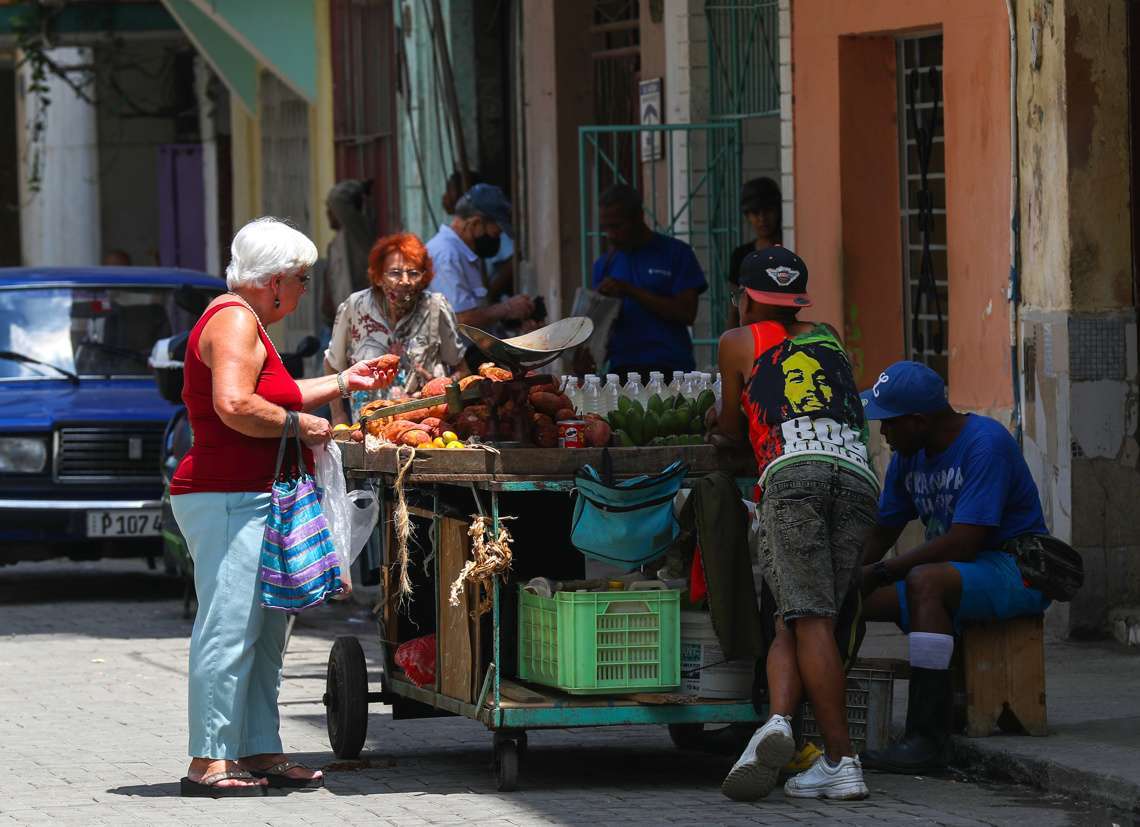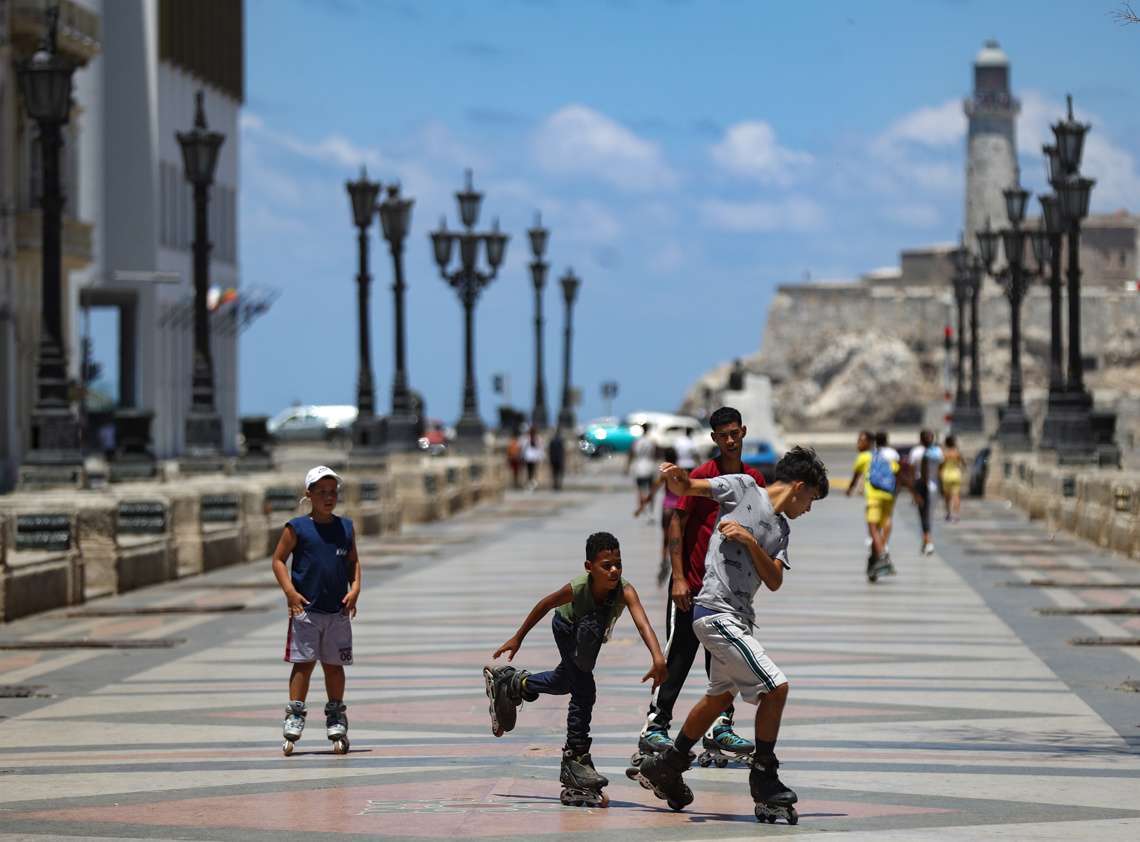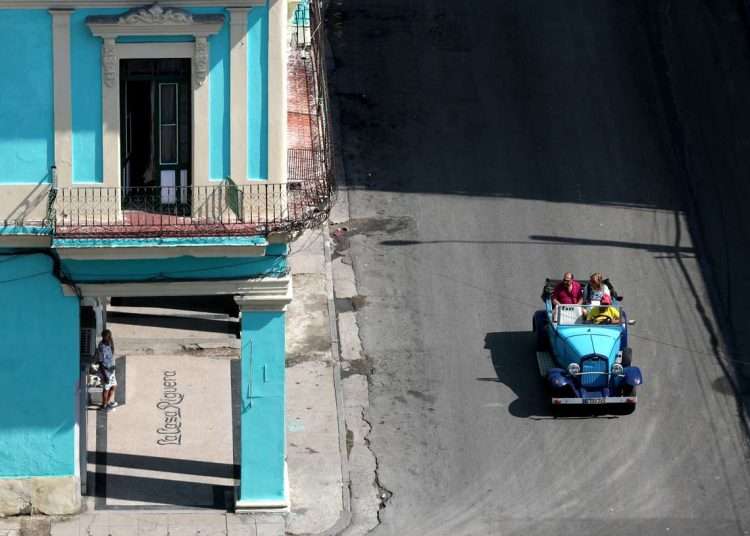In a few days, on May 16, it will be one year since the Biden administration announced measures for the “support to the Cuban people,” among which were some specific ones for the private sector on the island.
The government of the United States then made the commitment to resolve very specific aspects that impede or hinder the development of this sector, which already concentrates 35% of the active labor force, no less than 550,000 workers.
“We will encourage the growth of Cuba’s private sector,” the statement said, “by supporting greater access to U.S. Internet services, applications, and e-commerce platforms. We will support new avenues for electronic payments and for U.S. business activities with independent Cuban entrepreneurs, including through increased access to microfinance and training.”
Twelve months later, those promises have not been fulfilled.
The slight movements of the administration in relation to Cuba until now have contemplated the reopening of consular procedures and the granting of immigrant visas in Havana; the elimination of the limits to the sending of remittances; the reopening of the family reunification program and the inclusion of Cuba in the humanitarian parole program that started last January. Little more.
Most of the measures taken during the Trump administration to strengthen the U.S. sanctions policy against Cuba remain untouched. Among all of them, the inclusion in the List of State Sponsors of Terrorism has serious consequences for the development of the emerging private sector on the island.
A letter and seven requests
In a new attempt to make themselves noticed and take their point of view, without mediation, to the White House, a group of Cuban entrepreneurs wrote a new letter to President Biden, continuing a similar action on November 2021.
Owners of MSMEs, representatives of cooperatives and local development projects, independent workers and artists are adding their signatures to support this message, which includes a list of seven specific requests for the administration. (The text is attached at the end of the article.)
“We are doing our best to build a future in our country, to create opportunities for ourselves, our employees and families. We urge you again to fulfill your campaign promise to resume the path of engagement and normalization, and to fulfill your more recent promise of supporting the Cuban private sector..”
The signatories call on Biden to begin by acknowledging “significant harm that the sanctions imposed by the Trump administration and that your administration has maintained have brought over our businesses, families and communities.”
They also recall that the Democratic administration itself “recognizes that U.S. sanctions against Cuba have caused the current economic crisis facing our country.”
The coalition of organizations and individuals for the normalization of relations between Cuba and the United States, ACERE, has facilitated its web platform to publicize the letter and gather supporters.
In statements to OnCuba, Manuel Ramírez, ACERE spokesman, said that they expect “a respectful response from the administration that reflects an understanding of the wishes of the Cuban private sector as indicated in the letter.”
“This letter urges that specific measures be taken to benefit the Cuban private sector,” Ramírez explained, “including access to U.S. fintech companies, permission to open bank accounts in the United States, further easing the travel restrictions, establishing general licenses for open trade and lifting restrictions on U.S. exports to Cuba and Cuban exports to the United States. In order to achieve these measures, it is necessary to remove Cuba from the List of State Sponsors of Terrorism.”
Unlike the letter sent to Biden in November 2021 by Cuban private sector actors, this time the support of U.S. companies stands out.
So far, 7,867 people have signed, owners or representatives of 181 private companies and business organizations from Cuba and the United States (23), including associations and federations that represent thousands of companies and cooperatives, with millions of members.
Without tourists, there is no trade or benefit
One of the signatories of this letter-petition to Biden is Adriana Herrera, leader of Beyond Roots, a brand that has promoted Afro aesthetics and identity since 2016, in Old Havana.
Beyond Roots offers educational experiences to people who travel to Cuba and are interested in learning about Afro-Cuban roots through dance, music, culinary traditions, visual arts… This is its main source of income in foreign currency, with which it obtains the necessary inputs to develop the rest of its business lines.
It has managed to set up an Afro-style shop where everything from hair care products to accessories, souvenirs, utility products and pullovers with an identity message can be found. Added to this is a hairdressing salon specializing in Afro hair, with products of natural origin.
It also promotes Afro aesthetics and identity through live music performances, fashion shows, lectures and workshops, sometimes for free and other times by charging. And lastly, it manages a silk-screen printing workshop and a textile production area that also provides service to other ventures.
“Since we were children, we have been repeating like robots that the blockade affects us and is bad and that it has become the justification for all the things that go wrong in Cuba. But it wasn’t until I became an entrepreneur that I really understood the impact of the blockade and how it directly affects us,” Herrera said.
Travel to Cuba restrictions were intensified in the Trump era following the alleged “sonic attacks” in 2017 when the U.S. government reduced its embassy staff in Cuba to a minimum and discouraged U.S. citizens from traveling to the island, arguing that “they could run the risk of being victims of sonic attacks.”
Such attacks were never proven and, on the contrary, both the scientific and intelligence communities and the State Department itself agree that the so-called “Havana Syndrome” (despite cases having been reported in other countries) is not the result of a campaign led by an enemy of Washington.
A spokesperson said last March that “there is no common denominator” among those affected: some cases can be explained by “natural causes,” others by “environmental effects” and some have yet to be determined.
In fact, since the beginning of January, the diplomatic headquarters in Havana reopened without incident. In its Travel Alerts classification system, the United States government currently considers Cuba at Level 2; suggests greater caution in Cuba because “petty crime is a threat to tourists in Cuba.”
Far from deviating from Trump’s hard line, during Biden’s term measures have also been reinforced to make it difficult for travel to the island and not only for U.S. citizens.
In September 2022, the obligation was activated for foreign citizens who wish to visit the United States to request an entry visa if they have previously traveled to Cuba. A stab in the side of Cuba’s plans to encourage European markets.

Who does this policy affect?
Between 2020 and 2021, not only the pandemic was responsible for knocking out the Cuban tourism sector to the point of leaving it practically paralyzed. When the sanitary restrictions were lifted, U.S. policies played a key role in keeping not only the multi-story hotels in the main resorts and cities empty — including the new hotels that continued to be built despite the crisis —, but also private accommodation managed through platforms such as Airbnb.
The main source of income for the Cuban economy already has a high component related to the private sector of the economy. So tourism’s state of coma in Cuba was also devastating for enterprises dedicated to hotels, restaurants and private transportation, which are the majority in this emerging community of private enterprises.
Just to remember: in June 2017, Airbnb released a report in which it recognized that since 2015, when it began operating in Cuba, in the midst of the “thaw” of relations between the United States and Cuba, this had been the country where the number of offers grew the fastest, until it had more than 22,000 private accommodations spread over 70 cities and towns on the island. In just two years, this business brought in 40 million dollars in income for those Cuban hosts.
I want to grow and I can’t
The problems for someone with the business drive of Adriana Herrera do not stop there.
“Due to the blockade, the possibility of scaling our business is greatly limited. We can’t use tools like Shopify, or Trello [a basic online team management tool]. We also cannot operate a bank account outside of Cuba. Assuming that you manage to open a company in another country, no bank will accept you to open an account because Cuba is included in the List [of State Sponsors of Terrorism].”
“We would like to start offering Beyond Roots services through our own website, not just through Airbnb. We even want to launch an e-commerce. But being in Cuba it is practically impossible.”
The catalog of obstacles is large. Amaury Sánchez, president of a Matanzas cooperative dedicated to providing comprehensive electronic services since 2014, believes that “many of the Cuban ventures would achieve better results than they are showing today” if there were a change in policy towards Cuba by the United States.
When asked why he signed this letter to President Biden, he summarizes the concrete benefits that his cooperative would achieve.
“In our case, we would have access to bank loans that would allow us to have a stable source of supply. We could import raw materials and supplies, at a lower cost and more expeditiously if we could do it from the United States.”
“In addition, it would allow us to export quality goods and services to that country. We could create subsidiaries to produce or provide our services and it would give us the option of associating with businesspeople who show interest in our productions or services.”

Cooperatives too
From another side of the spectrum of non-state initiatives, Iran Morejón, representative of CO-EMPRENDE, has also signed the letter. CO-EMPRENDE is a socio-cultural project that wants to become a Local Development Project and is dedicated to the dissemination of knowledge about cooperatives and the social solidarity economy.
“The goal is for ordinary citizens to learn about cooperativism and economic democracy in a general sense. To do this, we organize free workshops, talks and publish articles. In order for there to be more cooperatives and for citizens to absorb knowledge about participatory budgets, it is necessary to socialize this information, in accordance with UN Resolution 56/114 which urges governments to promote cooperatives and ILO Recommendation 193 that advocates the inclusion of the study of the cooperative business model in the teaching programs at all levels of the national educational systems,” Morejón explained.
“Economic sanctions policies make it difficult to transfer technology, scare away investors, make freight transportation more expensive, and make it difficult for Cuba to join multilateral organizations that provide financial support for many collaboration projects.”
It’s not against the government, it’s against the people
The Democratic administration of Biden, despite its campaign promises, essentially maintains the policy approach towards Cuba bequeathed by Trump, contrary to the engagement that Obama began in 2014, when Biden was vice president.
From Washington, officials and spokespersons continue to argue that the sanctions are remote-directed and specifically against the Cuban government and its leaders. At the same time, they affirm that they support and favor all the people. But it is a difficult formulation to digest on the island, in the midst of lack of supplies and shortages of practically everything necessary to live.
In the long run and immediately, any restrictive action against the Cuban economy affects the group of actors that participate in it, either as producers or as consumers, and reinforces the suffering of ordinary people who do not hold posts or do not even support the government of Miguel Diaz-Canel.
“The economic performance of the Cuban cooperative sector, although it is not included within the state business spectrum, is also affected by extraterritorial sanctions applied by the U.S. government. The one who suffers the effects is the Cuban people,” Morejón commented.
For her part, Adriana Herrera responds exhaustively to the question of how it could benefit the general population that the administration take this request into account and solve the obstacles that prevent improvement in the operating conditions of the private sector in Cuba.
“Cuban entrepreneurs are also the Cuban people. It is a basic concept. Cuban entrepreneurs generate employment and affect us all. In addition to our own inefficiencies, the blockade is also responsible for shortages. The private sector in Cuba is playing a very important role, it generates dynamism and benefits for all the people who live in Cuba. If all those barriers that exist for us, associated with the blockade, could be brought down, we would have a direct positive impact on the living conditions of all people in Cuba.”
Cuba And U.S. Business Sectors Letter To President Biden About Support To Cuban Private Sector
Mr. President Biden,
Almost a year and half has passed since many of us sent you a letter with a similar request in November 2021. Soon, a year would have passed from the time when you announced measures to support the Cuban private sector in May 2022.
We write once more, as Cuban entrepreneurs, self-employees, business owners and cooperative members, part of the rapidly growing Cuban private sector. We are doing our best to build a future in our country, to create opportunities for ourselves, our employees and families. We urge you again to fulfill your campaign promise to resume the path of engagement and normalization, and to fulfill your more recent promise of supporting the Cuban private sector. We would like to reassert that your administration ought to start by recognizing the significant harm that the sanctions imposed by the Trump Administration and that your administration has maintained have brought over our businesses, families and communities. In fact, your own Administration recognizes that U.S. sanctions against Cuba have caused the current economic crisis facing our country. A January 9, 2023 Notice by Department of Homeland Security report states, Cuban latest migration wave has been “driven by three key factors: First, Cuba is facing its worst economic crisis in decades due to the lingering impacts of the COVID-19 pandemic, high food prices, and economic sanctions.”[1]
We welcome promised support in the form of “greater access to U.S. internet services, applications, and e-commerce platforms”, “expanding access to microfinance and training” and “options for electronic payments” that were announced in May 16, 2022.[2] We have not seen real progress in any of these areas. More importantly, your Administration should consider that our business success is greatly damaged by existing U.S. policy towards Cuba, which hinders our day-to-day business operations and reduces demand for our goods and services.
Current travel restrictions and inclusion of Cuba in the State Department’s States Sponsors of Terrorism (SSOT) List limit the flow of U.S. and European visitors, and have significantly reduced demand for our products, directly and indirectly. Three of the activities accounting for most of the employment in the private sector are precisely lodging, eateries, and transportation, which suffer directly from low U.S. and international tourism, and in turn reduce demand for other businesses.
The closure of non-immigrant visa consular services has diminished our ability to travel to the U.S. and directly acquire needed supplies. Cancellation of bank accounts in the U.S. for some Cuban small business owners has made financial transactions much more difficult and costly, including for receiving online payments. Inclusion of Cuba in SSOT list and measures taken against financial institutions continue to prevent e-payment and e-commerce platforms such as Paypal from providing services to us. Maintenance of the Trump Administration removal of the waiver for Helms Burton’s Title III, discourage potential U.S. and international investors in our businesses.
The Cuban private sector has grown very rapidly since new rules for self-employed, micro, small and medium enterprises (MSMEs) and cooperatives were passed in August 2021. We are now over 550,000 self-employed workers 7,500 private MSMEs and 5,000 coops employing near 35% of economically active population. Despite some remaining legal and regulatory limitations to our business operations, we can receive foreign investment from our family members and businesses abroad. We are independent from the Cuban government, as has been recently stressed by Benjamin Ziff, Chargé d’Affaires of the United States Embassy in Havana, Cuba [3].
It is incomprehensible and inhumane that in the middle of a domestic economic crisis exacerbated by the current global crisis, more than half into your term, your administration –which repeatedly claims to support the Cuban people and to support the private sector– has, for the most part, continued with Trump-era cruel and failed policies that directly target our livelihoods, and directly and indirectly also greatly affect our businesses.
You, as the President, still have the ability to immediately undo most of the measures taken by the Trump Administration. We commend you for making some progress with reopening some travel, the Embassy in Havana to some extent, and remittances, which were three of our requests in our previous letter. But this progress is still very limited compared to the needs and rights of both Cuban and American citizens, which continue to be disregarded. Unfortunately, our fourth demand remains without progress—it is imperative that Cuba is taken out of the SSOT if our businesses are to thrive.
It was proven during your tenure as Vice President that an US-Cuba policy allowing for increased travel, telecom and banking services helped us substantially. We ask again that you listen to us —members of the Cuban private sector—and not to a small community of Cuban-Americans who benefit from making US-Cuba policy a domestic, electoral issue despite having clear, immovable political allegiances.
We urge you to consider the following measures that will truly benefit our businesses, families and employees:
- Allowing financial transactions that have Cuban private entities as final destination and permitting Cuban private businesses to operate services of American fintech companies such as PayPal and the like.
- Allowing Cuban private companies and entrepreneurs to open and manage banking accounts in the U.S. territory, without requiring that Cuban entrepreneurs remain in U.S. territory to be able to operate them.
- Restating multi-entry business visas for Cuban private business owners and entrepreneurs.
- Restore travel to Cuba for U.S. citizens and residents under educational and people-to-people licenses.
- Establishing a general license allowing U.S. citizens and businesses to invest and/or trade with Cuban private businesses.
- Amend Cuban Assets Control Regulations, 31 CFR part 515 to:
- a. Include private Cuban Micro, Small and Medium-Sized Enterprises (MSMEs) and Cooperatives among the references to private businesses.
- b. Expand the reach of the general licenses for U.S. businesses to export all their products and services to Cuban private businesses.
- c. Expand the scope of goods and services from Cuban private businesses which can be imported to the United States.
- Removal of Cuba from the SSOT List, which is necessary in order to achieve all that is stated above in 1, 2, 5, 6 and 7.
Sincerely,




















Typical bussiness people ,you acan only see whats in it for you . if you want changes talk to you Government first, because that is where change has to happen , you have to give a little to get a little ….Bert